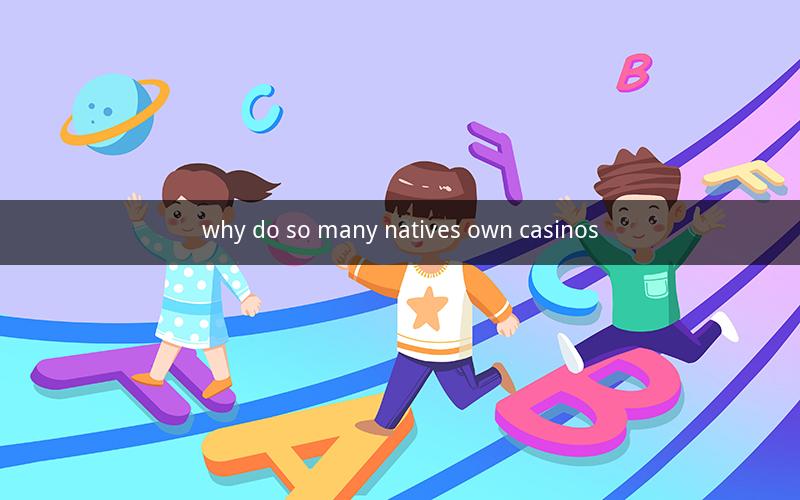
Table of Contents
1. Introduction to Native Casinos
2. Historical Context
3. Economic Benefits
4. Cultural Significance
5. Legal Framework
6. Challenges and Controversies
7. Success Stories
8. Conclusion
1. Introduction to Native Casinos
Casinos owned by Native American tribes have become a significant part of the gaming industry in the United States. These casinos operate on tribal lands and offer a variety of gaming options, from slot machines to poker and blackjack. But why do so many Native Americans own casinos?
2. Historical Context
The history of Native American casinos is rooted in the Indian Gaming Regulatory Act (IGRA) of 1988. This act allowed tribes to offer certain forms of gambling on their lands, providing a new source of revenue and economic opportunities. The act was a response to the economic struggles faced by many tribes and the potential for self-sufficiency through gaming.
3. Economic Benefits
One of the primary reasons Native Americans own casinos is the economic benefits they provide. Casinos can generate substantial revenue for tribes, which can be used for various purposes, including:
- Infrastructure Development: Funding for new roads, schools, and health care facilities.
- Community Services: Support for social services, education, and cultural preservation.
- Employment Opportunities: Jobs for tribal members and surrounding communities.
4. Cultural Significance
Casinos also hold cultural significance for many Native American tribes. They serve as a means to preserve and promote traditional values and practices. For some tribes, gaming is intertwined with their cultural heritage, and casinos can be seen as a way to reconnect with their roots.
5. Legal Framework
The legal framework surrounding Native American casinos is complex. IGRA established a three-tiered system for gaming, with tribes having the right to offer certain forms of gambling on their lands. However, the act also requires tribes to enter into compacts with state governments, which can be subject to negotiation and dispute.
6. Challenges and Controversies
Despite the economic and cultural benefits, Native American casinos face challenges and controversies. These include:
- Addiction: Concerns about gambling addiction and its impact on individuals and communities.
- Competition: Increased competition from non-Native casinos and other forms of gambling.
- Legal Issues: Disputes over the interpretation and enforcement of IGRA.
7. Success Stories
Many Native American tribes have achieved success through their casinos. The Navajo Nation's Navajo Nation Gaming Enterprise, for example, has become one of the largest gaming enterprises in the United States. The Seminole Tribe of Florida has also been successful, with their Hard Rock Hotel & Casino in Hollywood generating significant revenue.
8. Conclusion
The reasons why so many Native Americans own casinos are multifaceted. Economic benefits, cultural significance, and the legal framework provided by IGRA have all contributed to the growth of this industry. While challenges and controversies exist, the success stories of Native American casinos demonstrate the potential for positive impact on tribes and surrounding communities.
---
Questions and Answers
1. Question: What is the Indian Gaming Regulatory Act (IGRA)?
Answer: IGRA is a federal law that allows tribes to offer certain forms of gambling on their lands, providing a new source of revenue and economic opportunities.
2. Question: How do Native American casinos benefit their communities?
Answer: Casinos can provide funding for infrastructure development, community services, and employment opportunities, contributing to the economic and social well-being of tribal members and surrounding communities.
3. Question: What is the cultural significance of casinos for Native American tribes?
Answer: Casinos can serve as a means to preserve and promote traditional values and practices, helping tribes reconnect with their cultural heritage.
4. Question: What are some of the challenges faced by Native American casinos?
Answer: Challenges include concerns about addiction, increased competition, and legal disputes over the interpretation and enforcement of IGRA.
5. Question: Can you name a successful Native American casino?
Answer: The Navajo Nation's Navajo Nation Gaming Enterprise and the Seminole Tribe of Florida's Hard Rock Hotel & Casino in Hollywood are examples of successful Native American casinos.
6. Question: How do Native American casinos contribute to economic development?
Answer: Casinos can contribute to economic development by generating revenue for tribes, which can be used for infrastructure, community services, and job creation.
7. Question: What is the role of state governments in the operation of Native American casinos?
Answer: State governments enter into compacts with tribes to regulate the types of gaming allowed and to ensure compliance with federal and state laws.
8. Question: How do Native American casinos differ from non-Native casinos?
Answer: Native American casinos operate on tribal lands and are subject to the Indian Gaming Regulatory Act, which differs from the regulations that govern non-Native casinos.
9. Question: What is the impact of Native American casinos on the gaming industry?
Answer: Native American casinos have become a significant part of the gaming industry, contributing to its growth and diversification.
10. Question: How do Native American casinos address concerns about gambling addiction?
Answer: Casinos often provide resources and support for individuals struggling with gambling addiction, including counseling and treatment programs.